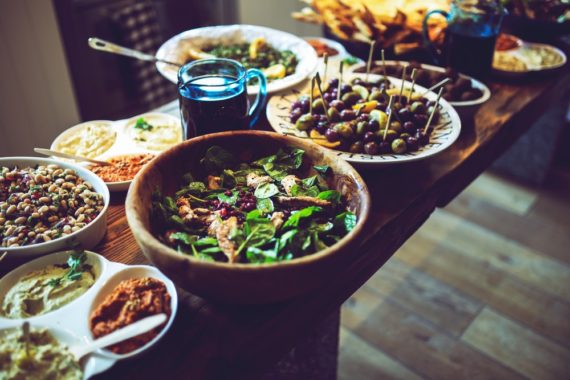 It’s a bit hard to believe, but Thanksgiving is around the corner!
It’s a bit hard to believe, but Thanksgiving is around the corner!
For some of us, just thinking about the holiday season is scary. It’s not because of all the traffic and extra shopping, but because food can be a real sore spot. This is especially true if you struggle with emotional eating or an eating disorder. When holiday celebrations have a bunch of rich and tasty dishes, they can pose quite a challenge to our mental and physical health.
You know how it goes. You sit down to a Thanksgiving plate that is overflowing with delicious and nostalgic food from your childhood. The temptation is unbearable! On one hand, you’re looking for the slightest bit of willpower to help you. On the other hand, you’re frantically trying to make an excuse for eating what you really want to with statements like:
- “Well, I guess I deserve it?”
- “It’s not healthy to deprive myself over the holidays.”
- “Right now I don’t, or I shouldn’t, care about calories.”
Sometimes this mental battle ends with us indulging. It becomes a problem when regret sinks in.
Changing the Name of the Game
I propose that the holidays don’t have to be like this. The emotional chaos can take all the joy out of your holiday season. You shouldn’t have to feel punished or deprived, but you also shouldn’t have to feel ashamed about something like food.
You CAN feel in control over the holidays. You CAN feel confident in your decision-making. I encourage you to try the strategies below to enjoy your holiday celebrations as much as you can. When January gets here, you may just find yourself even more empowered to keep working at your health goals.
Don’t Fret Thanksgiving. You Can Stay in Control of Food.
#1 Plan Carefully for Food at Celebrations
Set a goal for the holidays. If you are currently trying to lose weight, you might feel less pressure in putting your weight-loss goal on hold for a short period. In this case, reset your goal to focus on healthy habits or even weight maintenance. No matter what you try, make sure your primary focus is on how you feel instead of what the scale says.
Next, identify events and specific foods you know will tempt you. If your grandmother bakes the BEST pumpkin pie every year, prepare yourself for that. What’s your plan? You can either make an alternative dish for you to enjoy or decide ahead of time that you will eat a small amount. For example, take a couple savory bites or choose not to have a second plate as a midnight snack.
Other ways to plan for celebrations:
- Bring your own food or eat before going out.
- Take only tiny portions from each dish.
- Take a break at any event to regroup. Go to the bathroom or pop outside for a moment. Remind yourself that you have a goal.
- Eat slowly and enjoy every bite. If you truly like the taste, the experience will still be pleasurable. You will also most likely eat less.
- Choose wisely. Take small amounts of “must have” foods and walk away from any foods you’re not super excited about trying.
#2 Have a Strategy for Dealing with Family and Friends
Being around loved ones can sooth the soul. However, family and friends may sometimes try to:
- Convince you to eat food you don’t really want
- Make you feel guilty about passing up their prized dish
- Tease you about your attitude toward food
You can plan for a situation like this. Let them know ahead of time that your health goals are important to you. Can they support you? If you put a positive spin on how eating well has helped you, others will find it harder to pick at what you are doing.
You also should not feel pressure to announce your “diet” or talk about your weight. Most likely, other people won’t notice what you are eating. If they do, try to be understanding. Not everyone has the same mindset about health. They may take it personally but you don’t have to.
#3 Work on Your Mindset
Think about your relationship with food during the holidays. Why do we focus on it so much? Happiness comes from health and confidence. It does NOT come from food.
As the holiday season begins and Thanksgiving creeps closer, reflect on your feelings toward food. If you tend to overeat, dig deep to ask yourself why. It might help if you journal your thoughts or speak with a therapist. You might realize that you have other challenges to work through beyond food and weight-loss.
Final Words of Advice
Mindful eating will help you at Thanksgiving and in handling the holidays. Overeating comes from mindless eating. Allow yourself small to moderate amounts of food you love and enjoy every bite. Eat slowly and focus on textures and flavors. Be present and appreciate each moment. With practice, mindful eating will slow you down and help you eat a comfortable amount. You should feel free to enjoy what’s on your plate without the added guilt.
 About the Author:
About the Author:
Jill Cruz, MS, CNS, has a Master of Science in Human Nutrition from the University of Bridgeport, CT. She is a Board Certified Nutrition Specialist that specializes in weight-loss, metabolic syndrome, fitness nutrition and health optimization. Jill combines her science-based background with tons of practical nutrition, fitness and lifestyle guidance, and a special emphasis on mindset, accountability and building a pile of healthy habits.

